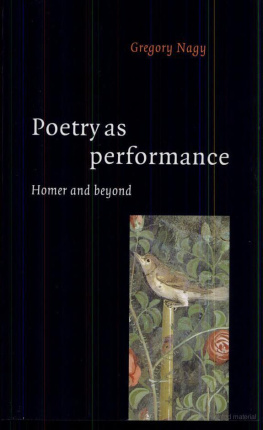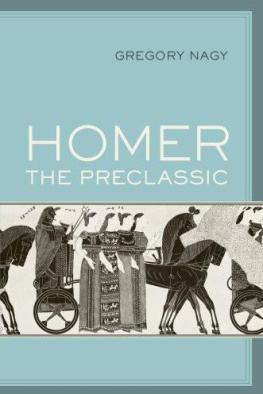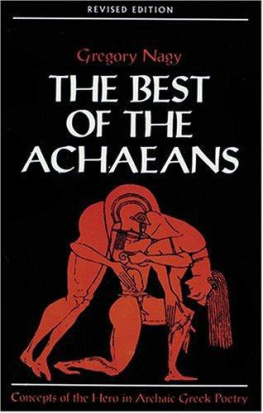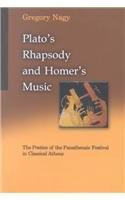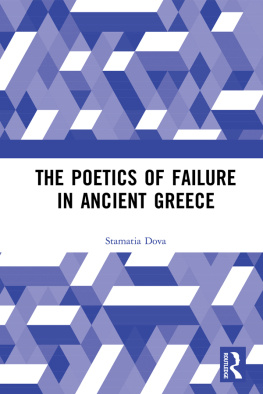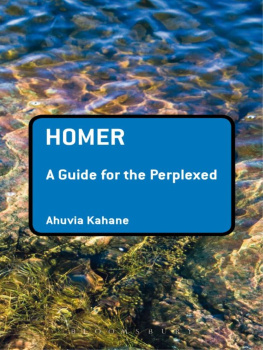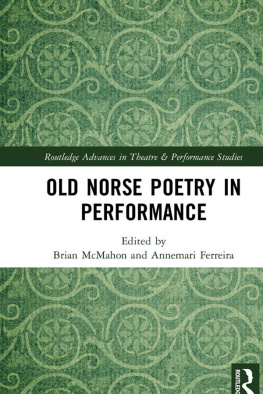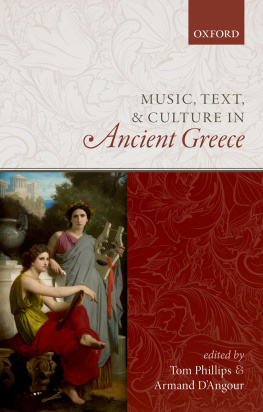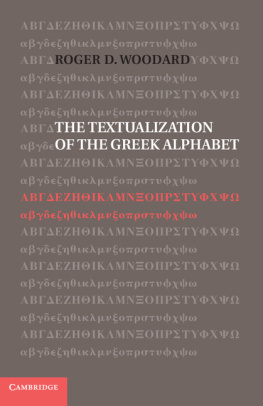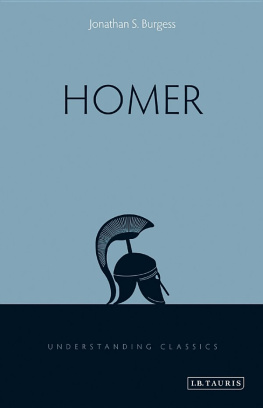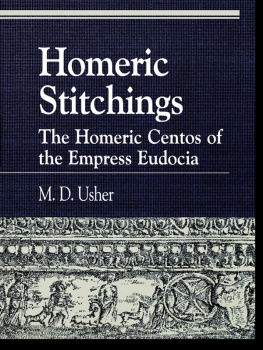Preface to the Online Edition
originally published in 1996 by Cambridge University Press
published online in 2009 by the Center for Hellenic Studies, with the permission of CUP
original page-numbers are indicated within braces (for example, {1|2} indicates the break between pages 1 and 2)
Preface for the 1996 version
This book grew out of the J. H. Gray Lectures that I gave for the Faculty of Classics at the University of Cambridge on 10, 12, and 14 May 1993. I am very grateful to the faculty, students, and friends of the Faculty, many of whom are singled out below, for the happy memories of my visit.
A shorter verson of Chapter 5 was read as a paper at an international conference organized by Franoise Ltoublon, the Colloque Milman Parry, held at the University of Grenoble on 14, 15, and 16 September 1993.
This book took a long time to write, and I was fortunate to get the advice of many people along the way. These include: Elizabeth Adkins-Regan, Robert Albis, Margaret Alexiou, Nancy Andrews, Ernst Badian, Ann Batchelder, Victor Bers, Graeme Bird, David Blank, Timothy Boyd, P. G. McC. Brown, Myles Burnyeat, Paul Cartledge, Matthew Clark, R. G. G. Coleman, Derek Collins, Gregory Crane, Olga M. Davidson, Laurence de Looze, Marian Demos, Carol Dougherty, Peter Dronke, Ursula Dronke, Andrew Dyck, Andrew Ford, Patrick K. Ford, Philip M. Freeman, Marjorie Garber, Simon Goldhill, John Hamilton, Michael Haslam, Albert Henrichs, Carolyn Higbie, Genevive Husson, Barbara Johnson, C. P. Jones, Pierre Judet de La Combe, Charles de Lamberterie, Andr Lardinois, Franoise Ltoublon, Geoffrey Lloyd, Janet Lloyd, Anthony A. Long, Nicole Loraux, Mary Louise Lord, Deboral Lyons, Richard P. Martin, Michael Messersmith, Steven Meyer, Elisabeth Mitchell, Stephen A. Mitchell, John Morgan, Kenneth Morrell, Oswyn Murray, Blaise Nagy, Joseph Nagy, Robin Osborne, George Pepe, Ann Perkins, Rubert T. Pickens, M. D. Reeve, Panagiotis Roilos, Philippe Rousseau, Ian Rutherford, William Sale, Albert Schachter, Elizabeth Scharffenberger, David, Schur, Charles Segal, Kathryn Slanski, Laura Slatkin, Christiane Sourvinou-Inwood, Richard Tarrant, Richard Thomas, Thomas du Toit, S. V. Tracy, Roger Travis, Emily Vermeule, Dimitrios Yatromanolakis, Jenny Wallace, Calvert Watkins, Heather Williams, Dan Wiley, James Zetzel, Jan Ziolkowski, Bella Zweig. To anyone whose name I may have forgotten in this list, I apologize. Also, I assume responsibility for whatever mistakes may remain.
The title of this book is an indirect tribute to the pioneering anthropological insights of Richard Bauman, Verbal Art as Performance (Prospect Heights, Ill. 1988).
On 7, 13, and 17 January 1994, I had a chance to repeat my Gray Lectures, this time in French, at the Ecole des Hautes Etudes en Sciences Sociales in Paris, thanks to the initiative of my friend Nicole Loraux. She has always been the most supportive of colleagues, but I particularly appreciated her encouragement as I was struggling with the final phases of this book. In the fall of 1994, just as I was about to write to her to announce jokingly that the ordeal was finally over, I learned, to my shock, that Nicole had suddenly become very ill. As I write this, she continues a gallant struggle aginst the effects of her illness, living out the heroic meaning of an ancient Greek world for ordeal that she herself has understood better than any other Hellenist, pnos. I dedicate this book to her in recognition of her heroic courage, and in fond hopes that she will prevail yet again, as she has always prevailed before.
Introduction: A Brief Survey of Concepts and Aims
The two central concepts of this book can be summed up in the words performance and composition, which are to be taken as two different aspects of one process in oral poetics. The emphasis here is on performance, as the title of the book indicates.
The basic work on the interaction of performance and composition continues to be Albert Lords The Singer of Tales. [ Though it is cited by many who offer various arguments about oral poetry, the book is often treated only superficially, and there are even instances where those who agree or disagree with it have evidently not read it at all.
The complementarity of performance and composition, as observed by Lord, parallels that of parole and langue, as formulated by Ferdinand de Saussure in the field of linguistics. [
The English noun song, along with the verb sing, expresses admirably the coexistence of performance and composition as a {1|2} continuum. Further, the idea of performance inherent in song, which is absent from the word poetry, makes it more useful to apply the word song rather than poetry to archaic Greek traditions, which do not explicitly distinguish song from poetry. The resonance of performance led Albert Lord to describe the medium of the South Slavic guslar - and of Homer - as song rather than poetry. The same idea figures prominently in the title of his pathfinding book, The Singer of Tales. [
The background for applying the linguistic terms langue and parole, especially with reference to other linguistic terms such as synchronic and diachronic, unmarked and marked, has been worked out in Pindars Homer, a compendium of over ten years of research, [
A qualification is needed concerning the term comparative, which in linguistics can be used in two senses, one more specific and the other more general. The first is represented by the mthode comparative, perfected by linguists like Antoine Meillet, where comparison entails the study of cognate forms and meanings within the discipline of historical linguistics. [ While {2|3} the establishing of cognates or borrowings is a matter of empirically proving a historical connection between the languages compared, the adducing of typological parallels need not be taken as proof for a given argument, but only as an intuitive reinforcement. The beyond in the subtitle of this book refers to both senses of comparison, applied to the study of song and poetry in performance.
Suffice it for the moment to offer one example each of the two senses of the term comparative. To start with the more specific sense: if we compare the meters of Song 44 of Sappho with those of Homeric hexameter, we are dealing with forms that are arguably cognate, that is, derivable from a common source. [ Such a comparison is not a matter of proving something outright, since the Greek and the Athapascan traditions are obviously unrelated to each other historically. What is achieved, rather, is simply the enhanced likelihood that parallel lines of interpretation might lead to a deeper understanding of the individual traditions being compared.
One long-range comparative inference reached in previous work extends into the present book, which is, that group dynamics in performance help explain solo dynamics more effectively than the other way around. [ This inference leads to a new emphasis on the distinction between group and audience, which in turn leads to refinements of the Greek concept of mimesis. Ultimately, these questions converge on a more specific question, that is, the relationship of lyric and epic.
Epic is more difficult to define diachronically than lyric. The eventual form of ancient Greek epic is more complex than that of lyric, despite the fact that epic happens to be the earliest-attested body of literature in Greek history. [
The ultimate aim, then, is to show that both epic and lyric in ancient Greece were fundamentally a medium of mimesis, which we can understand only if we keep asking how, when, where, and why these two kinds of verbal art were

